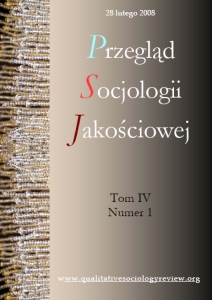Interakcyjne uwarunkowania procesu stawania się ofiarą mobbingu
DOI:
https://doi.org/10.18778/1733-8069.4.1.07Słowa kluczowe:
mobbing, bullying, psychoterror, przemoc w miejscu pracy, teoria ugruntowana, metody jakościoweAbstrakt
Celem, jaki przed sobą postawiłem jest spojrzenie na niektóre aspekty mobbingu z perspektywy założeń symbolicznego interakcjonizmu. W centrum moich analiz ulokowałem interakcje pomiędzy osobą nękaną, mobberem, a także otoczeniem zawodowym oraz innymi osobami, którym mobbowany pracownik przypisuje duże znaczenie. Wnioski, jakie prezentuję w niniejszym artykule opierają się na badaniach przeprowadzonych przeze mnie w latach 2004–2007 wśród osób nękanych psychicznie oraz ekspertów, którzy z racji swego zawodu zajmują się problemem mobbingu. Zastosowałem technikę wywiadów narracyjnych oraz swobodnych. Łączna ilość wywiadów wyniosła 69. W poszukiwaniach danych empirycznych oraz ich interpretacji przyjąłem założenia metodologii teorii ugruntowanej.
Pobrania
Bibliografia
Blumer, Herbert (1969) Symbolic Interactionism. Perspective and Method. Englewood, New Jersey: Prentice-Hall, Inc.
Google Scholar
Bokszański, Zbigniew (1989) Tożsamość, interakcja, grupa. Tożsamość jednostki w perspektywie teorii socjologicznej. Łódź: Wydawnictwo Uniwersytetu Łódzkiego.
Google Scholar
Charmaz, Kathy (2006) Constructing Grounded Theory. A practical Guide Through Qualitative Analysis. London: SAGE Publications.
Google Scholar
Dymarczyk, Waldemar (2006) Temporalny wymiar karier menedżerskich, niepublikowana praca doktorska.
Google Scholar
Einarsen, Stale; Hoel, Helge; Zapf, Dieter; Cooper, Cary L. (2003) “The concept of bullying at work.” S. 3-31 w Bullying and Emotional Abuse in the Workplace. International perspectives in research and practice, (Red.) S. Einarsen, H. Hoel, D. Zapf, C.L. Cooper. London, New York: Taylor&Francis.
Google Scholar
DOI: https://doi.org/10.4324/9780203278734
Garfinkel, Harold (1956) “Conditions of Successful Degradation Ceremonies.” American Journal of Sociology LXI: 420-24.
Google Scholar
DOI: https://doi.org/10.1086/221800
Glaser, Barney, G., Strauss, Anzelm, L. (1967) The discovery of grounded theory: strategies for qualitative research. New York: Adline Publishing Company.
Google Scholar
Goffman, Erving (2005) Piętno, tłum. A. Dzierżyńska, J. Tokarska-Bakir. Gdańsk: Gdańskie Wydawnictwo Psychologiczne.
Google Scholar
Hałas, Elżbieta (1994) Obywatelska socjologia szkoły chicagowskiej. Lublin: Redakcja Wydawnictw Katolickiego Uniwersytetu Lubelskiego.
Google Scholar
Hubert, Adrienne B.; van Veldhoven Marc (2001) “Risk sectors for undesirable behaviour and mobbing.” European Journal of Work and Organizational Psychology 10 (4): 415-424.
Google Scholar
DOI: https://doi.org/10.1080/13594320143000799
Klapp, Orrin (1949) “The Fool as a Social Type.” American Journal of Sociology LV: 157-162.
Google Scholar
DOI: https://doi.org/10.1086/220485
Konecki, Krzysztof T. (2000) Studia z metodologii badań jakościowych: teoria ugruntowana. Warszawa: Wydawnictwo Naukowe PWN.
Google Scholar
Lawrence, Claire; Leather Phil (1999) “The social psychology of violence and aggression.” S. 34-52 w Work – related violence. Assessment and Intervention, (Red.) P. Leather, C. Brady, C. Lawrence, D. Beale, T. Cox. New York: Routledge.
Google Scholar
DOI: https://doi.org/10.4324/9781003209270-4
Leymann, Heinz (1996) “The Content and Development of Mobbing at Work.” European Journal of Work and Organizational Psychology 5 (2): 165-184.
Google Scholar
DOI: https://doi.org/10.1080/13594329608414853
McCormack, Coralie (2004) “Storying stories: a narrative approach to in-depth interview conversations.” International Journal of Social Research Methodology, Jul., Vol. 7(3): 219-236.
Google Scholar
DOI: https://doi.org/10.1080/13645570210166382
McKevitt, Christopher (2000) “Short stories about stroke: interviews and narrative production.” Anthropology & Medicine 7(1): 79-96.
Google Scholar
DOI: https://doi.org/10.1080/136484700109368
Niedl, Klaus (1996) “Mobbing and Well-being: Economic and Personnel Development Implications.” European Journal of Work and Organizational Psychology 5(2): 239–249.
Google Scholar
DOI: https://doi.org/10.1080/13594329608414857
Prus Robert, Grills Scott (2003) The Deviant Mystique: Involvements, Realities and Regulation. Westport: Preager.
Google Scholar
Rokuszewska-Pawełek, Alicja (2002) Chaos i przymus. Trajektorie wojenne Polaków – analiza biograficzna. Łódź: Wydawnictwo Uniwersytetu Łódzkiego.
Google Scholar
Rosenthal, Gabriele (1990) „Rekonstrukcja historii życia. Wybrane zasady generowania opowieści w wywiadach biograficzno-narracyjnych.” Tłum. Nina Nowakowska [w:], Metoda biograficzna w socjologii. pod red. J. Włodarka i M. Ziółkowskiego. Warszawa, Poznań: PWN.
Google Scholar
Salin, Denise (2003) “Ways of explaining workplace bullying: A review of enabling, motivating and precipitating structures and processes in the work environment.” Human Relations 56 (10): 1213-1231.
Google Scholar
DOI: https://doi.org/10.1177/00187267035610003
Salmivalli, Christina; Lagerspetz, Kirsti; Björkqvist, Kaj; Österman, Karin; Kaukialnen, Ari (1996) “Bullying as a Group Process: Participant Roles and Their Relations to Social Status Within the Group.” Aggressive Behavior 22(1): 1-15.
Google Scholar
DOI: https://doi.org/10.1002/(SICI)1098-2337(1996)22:1<1::AID-AB1>3.0.CO;2-T
Strauss, Anselm L. (1969) Mirrors and Masks. The Search for Identity. San Francisco, Call: The Sociology Press.
Google Scholar
Taylor, Stephanie; Littleton, Karen (2006) “Biographies in talk: A narrative-discursive research approach.” Qualitative Sociology Review, Volume II, Issue 1: 22-38.
Google Scholar
DOI: https://doi.org/10.18778/1733-8077.2.1.03
Wolff, Kurt H. (1964) The Sociology of Georg Simmel, Glencoe, Free Press.
Google Scholar
Zapf, Dieter (1999) “Organizational, work group related and personal causes of mobbing/bullying at work.” International Journal of Manpower 20(1/2): 70-85.
Google Scholar
DOI: https://doi.org/10.1108/01437729910268669
Zapf, Dieter Knorz, Carmen, Kulla, Matthias (1996) “On the relationship between Mobbing Factors, and Job Content, Social Work Environment, and Health Outcomes.” European Journal of Work and Organizational Psychology 5 (2): 215-237.
Google Scholar
DOI: https://doi.org/10.1080/13594329608414856
Pobrania
Opublikowane
Jak cytować
Numer
Dział
Licencja

Utwór dostępny jest na licencji Creative Commons Uznanie autorstwa – Użycie niekomercyjne – Bez utworów zależnych 4.0 Międzynarodowe.














